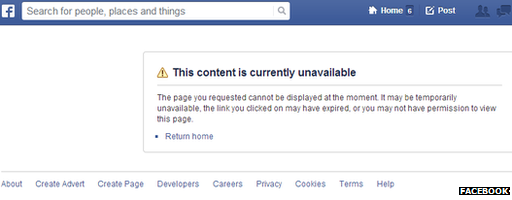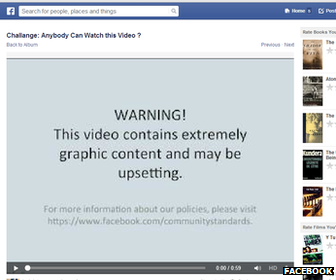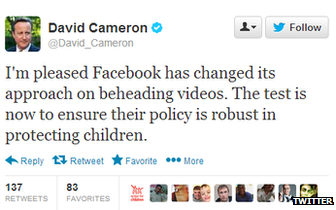Facebook makes U-turn over decapitation video clip
- Published
- comments

A Facebook page that hosted a decapitation video now says it is unavailable
Facebook has removed a video clip showing a woman's decapitation and issued new rules about what can be shared on its site.
The U-turn comes two days after it was revealed the firm had dropped a ban on clips showing extreme violence.
The BBC understands that Facebook did this in July after issuing new guidance to staff, but did not think the public would be interested to know.
The British prime minister has accused the firm of being "irresponsible".
Facebook's own safety advisers have also voiced concerns.
The US firm now says it will still allow some graphic content but will take a more comprehensive look at its context.
This time Facebook outlined its revised policy in a press release, external.
"First, when we review content that is reported to us, we will take a more holistic look at the context surrounding a violent image or video, and will remove content that celebrates violence," it said.
A Facebook page that hosted a decapitation video now says it is unavailable
"Second, we will consider whether the person posting the content is sharing it responsibly, such as accompanying the video or image with a warning and sharing it with an age-appropriate audience.
"Based on these enhanced standards, we have re-examined recent reports of graphic content and have concluded that this content improperly and irresponsibly glorifies violence. For this reason, we have removed it."
At time of writing other decapitation videos could still be found on the site without warning messages.
'Community standard'
The announcement follows a series of flip-flops by the company.
On May 1, when questioned about death clips being shared on the site, the firm told the BBC that its users had the right to depict the "world in which we live".
However, less than two hours after the BBC published an interview with one of the firm's safety advisers - who raised concerns about the harm this could cause teenagers - it announced a change of tack.
"We will remove instances of these videos that are reported to us while we evaluate our policy and approach to this type of content," it declared.
The company promised at the time to announce its decision when the review was completed.
But at the start of this week the BBC was contacted by one of the social network's members who had complained about a clip uploaded on 16 October, which the company was refusing to take down.
"The video shows a woman having her head cut off by a man in a mask," the user wrote.

The video was still accessible on Facebook on Tuesday, but covered by a warning notice
"She is alive when this happens. Looking at the comments a load of people have reported this to Facebook and had the same reply."
An Australian police force was among those who had complained. It said it had been told by Facebook's moderators that the video "did not violate our community standard on graphic violence".
When questioned on Monday, a spokeswoman for Facebook confirmed that the ban had indeed been dropped and that the company had introduced a new rule: such material could be posted and shared on the site so long as the original post did not celebrate or encourage the actions depicted.
This prompted David Cameron to tweet on Tuesday: "It's irresponsible of Facebook to post beheading videos, especially without a warning. They must explain their actions to worried parents."
Stephen Balkam, the chief executive of the Family Online Safety Institute (Fosi) charity - who sits on the network's Safety Advisory Board - said he was "unhappy" at the move, which he had not been told about in advance.
Many of the site's users also questioned why it allowed such extreme footage but banned images and videos showing a woman's "fully exposed breast".
Facebook subsequently added an alert to the video, replacing the banner image with the words: "Warning! This video contains extremely graphic content and may be upsetting."
But last night it changed its policy again, and visitors to the page are now told: "This content is currently unavailable."
In response Mr Cameron tweeted: "I'm pleased Facebook has changed its approach on beheading videos. The test is now to ensure their policy is robust in protecting children."
Mr Balkam also welcomed the move.
"The Family Online Safety Institute is encouraged by the changes that Facebook announced today to the posting of graphic or disturbing material," he said in a statement.
"In order to protect young people in particular, it is imperative that Facebook - and all other social media sites - have in place a review process for this type of material and provide warnings where appropriate."
London-based Childnet International, another of Facebook's safety advisers, said it still wanted more information.

Prime Minister David Cameron has welcomed the fact that Facebook took the video off its site
"If they've taken it down I welcome that," said the charity's chief executive Will Gardner told the BBC.
"But I want to find out more and look into this further."
Age limits
Google's rival Google+ social network has more restrictive guidelines on graphic content: "Do not distribute depictions of graphic or gratuitous violence," it states., external
There are videos on its YouTube service in which people discuss beheadings and provide links to explicit footage, but the firm has removed videos showing the act of murder from its own site.
"While YouTube's guidelines generally prohibit graphic or violent content, we make exceptions for material with documentary, or news value," a spokesman added.
"In cases where a video is not suitable for all viewers, we're careful to apply warnings and age-restrictions to safeguard people using our site."
- Published22 October 2013
- Published22 October 2013
- Published21 October 2013